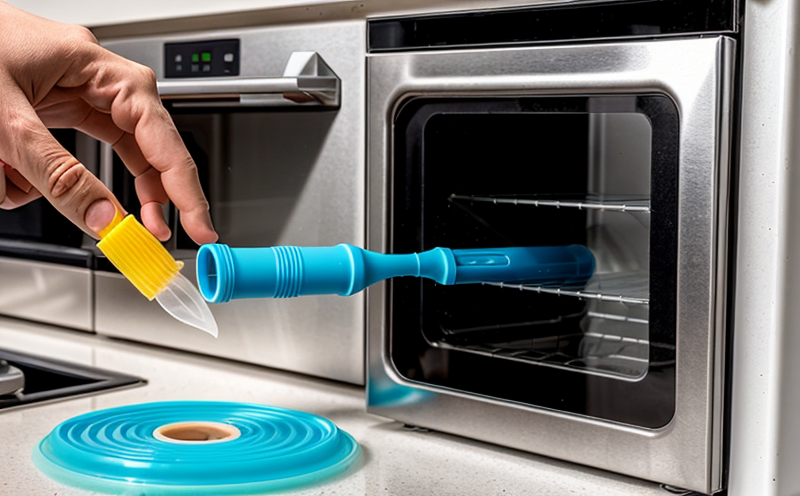ISO 75 Heat Deflection Temperature Testing of Household Plastics
The ISO 75 standard specifies a method to determine the heat deflection temperature (HDT) of plastics. This crucial property measures how a plastic material behaves under load at high temperatures, which is essential for household applications where materials are subjected to prolonged or fluctuating temperatures.
For household plastics, this test is particularly important because it helps ensure that items like containers, lids, and other storage solutions can withstand the conditions they are likely to encounter. The HDT provides a critical value indicating at what temperature a specimen will start to deflect under load, thus informing on the material’s thermal stability.
The testing procedure involves placing a sample of the plastic in contact with a rigid support and subjecting it to a specified load while gradually increasing the temperature until deflection occurs. The temperature at which this happens is recorded as the HDT. This measurement is critical for manufacturers, as it helps them optimize material selection and design for durability under typical household conditions.
Understanding the HDT of materials used in household items ensures that products are safe and functional when exposed to heat, such as during dishwashing or storage at room temperature. Compliance with this standard is important not only for ensuring product safety but also for maintaining brand reputation and meeting regulatory requirements.
The ISO 75 test can be conducted on various types of plastic materials used in household products, including polyethylene (PE), polypropylene (PP), polystyrene (PS), and others. This flexibility allows manufacturers to select the most appropriate material for their product’s specific needs while ensuring that it meets international standards.
Compliance with ISO 75 is particularly important for companies involved in household goods manufacturing, as it helps them demonstrate adherence to quality control processes and regulatory requirements. By conducting this test, businesses can ensure they are delivering safe, high-quality products that meet consumer expectations and industry benchmarks.
Why It Matters
The ISO 75 Heat Deflection Temperature Testing is vital for ensuring the safety and performance of household plastics. By measuring the temperature at which a plastic specimen begins to deflect under load, this test provides critical insights into the material’s thermal stability. This information is essential for manufacturers looking to optimize their product designs and ensure that materials can withstand the conditions they are likely to encounter in everyday use.
Compliance with ISO 75 helps businesses demonstrate adherence to quality control processes and regulatory requirements. It ensures that products are safe, functional, and meet consumer expectations. This standard is particularly important for companies involved in household goods manufacturing, as it contributes to maintaining brand reputation and ensuring product safety.
The test results from this procedure can also inform design decisions, helping manufacturers choose the most appropriate material for their product’s specific needs. By selecting materials with the right HDT, businesses can ensure that their products are durable and reliable under typical household conditions.
Moreover, ISO 75 helps in identifying potential issues early on, allowing for corrective measures to be implemented before mass production begins. This proactive approach not only improves product quality but also reduces the risk of recalls or product failures, which can have significant financial implications.
Benefits
- Enhanced Material Selection: Identifying the most suitable plastic material for specific applications to ensure durability and performance.
- Improved Product Design: Optimizing product design based on HDT data to enhance functionality and reliability.
- Increased Safety: Ensuring that household products can withstand heat without compromising safety or quality.
- Regulatory Compliance: Demonstrating adherence to international standards, ensuring legal compliance and market access.
By conducting ISO 75 Heat Deflection Temperature Testing, manufacturers can ensure they are delivering safe, high-quality products that meet consumer expectations. This testing process provides essential data on material performance under heat stress, which is crucial for optimizing product design and ensuring long-term reliability.
Environmental and Sustainability Contributions
The ISO 75 Heat Deflection Temperature Testing plays a role in enhancing the environmental sustainability of household plastics by helping manufacturers make informed decisions about material selection. By ensuring that materials can withstand high temperatures without degrading, this test supports the development of products that are more durable and long-lasting.
- Reduced Waste: Products that meet ISO 75 standards are less likely to fail prematurely, reducing the need for replacements and thus minimizing waste.
- Eco-Friendly Design: By selecting materials with appropriate HDTs, manufacturers can design products that have a lower environmental impact throughout their lifecycle.
The test also aids in the development of recyclable or biodegradable materials by ensuring they meet performance standards. This ensures that even if these materials are used, they will not fail under conditions typical to household use, thereby extending product life and reducing waste.
Furthermore, compliance with ISO 75 helps businesses demonstrate their commitment to environmental sustainability, which can be a key factor for consumers choosing eco-friendly products. By ensuring that household plastics meet this standard, manufacturers contribute positively to the broader goal of sustainable development.





